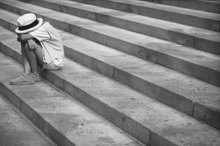What does fact checked mean?
At Healthfully, we strive to deliver objective content that is accurate and up-to-date. Our team periodically reviews articles in order to ensure content quality. The sources cited below consist of evidence from peer-reviewed journals, prominent medical organizations, academic associations, and government data.
The information contained on this site is for informational purposes only, and should not be used as a substitute for the advice of a professional health care provider. Please check with the appropriate physician regarding health questions and concerns. Although we strive to deliver accurate and up-to-date information, no guarantee to that effect is made.
Self Calming Techniques for Anxiety
Forty million American adults suffer from anxiety disorders, according to the Anxiety Disorders Association of America 1. While many take prescription anti-anxiety medications, sufferers can also adopt a daily routine of self-calming techniques that lessen the everyday stressors that trigger anxiety attacks. Talk to your doctor before beginning any at-home anxiety treatment or therapy; he may suggest personalized techniques for relaxation.
If you are experiencing serious medical symptoms, seek emergency treatment immediately.
Take a deep breath and count to 10. Anxiety can make you want to take immediate, impulsive action to solve a problem, but taking a 10-second time-out when you're feeling overwhelmed will help you make better decisions.
How to Deal With Anxiety by Changing Your Perspective
Learn More
Ask yourself if a problem is really as bad as it seems. Are you overreacting to a person or situation that seems to bring about your anxiety attacks? Is there a better way to handle the issue? Anxiety can be a cause of or reaction to feelings of powerlessness and loss of control, so try to put things in perspective and realize that you can't regulate all the forces around you.
Eliminate your triggers as much as possible. Triggers are people, situations or thoughts that send anxiety sufferers into panic mode. Working through problems or dilemmas in a logical, productive way can reduce the triggers' effect.
What Are the Causes of Anxiety From a Behavioral Perspective?
Learn More
Exercise regularly. The Mayo Clinic suggests exercising on most days of the week to get your mind off the anxiety circuit. Walking, jogging, lifting weights, dancing or taking a fitness class will both ease your mind and improve your health. Meditation, yoga or tai chi will also focus the mind away from anxious feelings.
Eat a healthy, balanced diet. Proper nutrition is key to warding off anxiety and potential related problems, such as heart palpitations, hyperventilation, insomnia and other mental health disorders. Quit smoking and avoid drinking alcohol, a depressant that may contribute to anxiety.
Listen to a CD of calming music to relax and recenter yourself when the going gets tough. Load your iPod with relaxing soundscapes or uplifting tunes to accompany your exercise sessions.
Get plenty of sound sleep. The effects of restless nights and insomnia can compound over time, leaving you feeling unable to cope with anxiety. Good sleep refreshes your faculties.
Warnings
If your anxiety worsens or continues to disrupt your daily life in significant ways, talk to a doctor or therapist. She may prescribe antianxiety medication to complement your at-home relaxation techniques.
Related Articles
References
- Anxiety Disorders Association of America: Tips to Manage Anxiety and Stress
- Mayo Clinic: Anxiety: Lifestyle and Home Remedies
- National Institute of Mental Health. Anxiety Disorders. Updated July 2018.
- American Psychiatric Association. Diagnostic and statistical manual of mental disorders (Fifth edition). Washington, D.C.: American Psychiatric Association; 2013.
- Gregory KD, Chelmow D, Nelson HD, et al. Screening for anxiety in adolescent and adult women: A recommendation from the Women's Preventive Services Initiative. Ann Intern Med. 2020. doi:10.7326/M20-0580
- Kaplan MD, Harold I, Sadock MD, Benjamin J. Synopsis of Psychiatry, Eleventh Edition. 2014;Baltimore: Williams & Wilkins.
Resources









